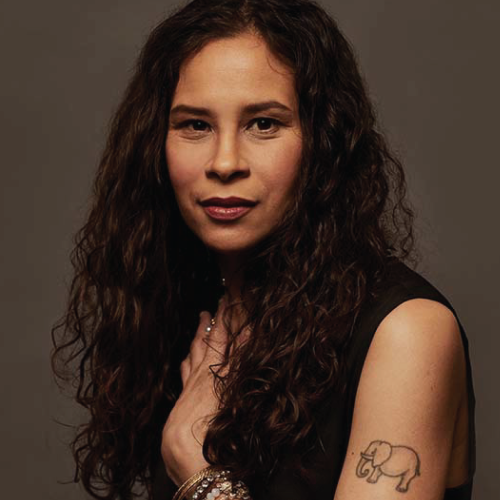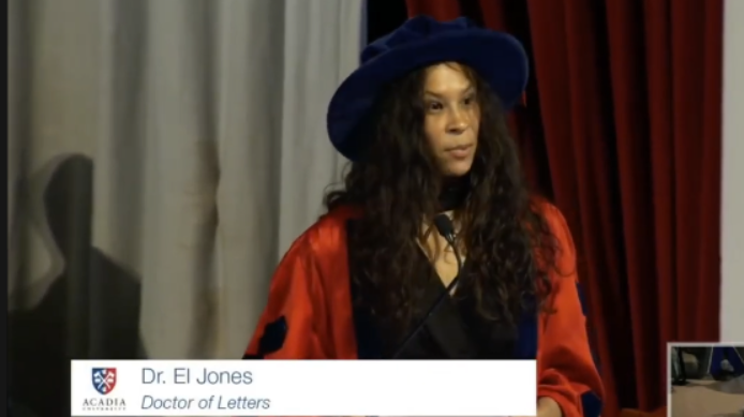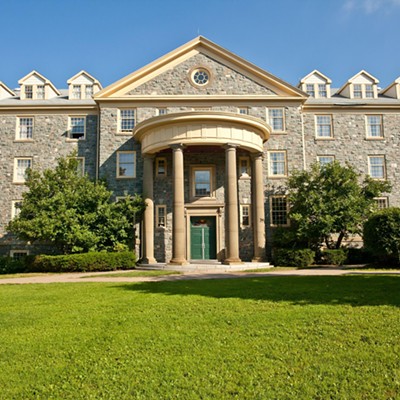What is anti-oppressive education?
“It begins with the idea that education is a right for all,” says El Jones, an assistant professor at Mount St. Vincent University–MSVU–a spoken word poet, a writer, a journalist, and a community activist whose work focuses on feminism, prison abolition, anti-racism and decolonization.
“Everybody has the capacity for education, and everybody has a right to it no matter what their circumstances. We begin there and then we try to navigate that system.”
The "system" that Jones is navigating is twofold: the university and the prison. The “we” is a small team at MSVU that supports incarcerated students through an ad-hoc “prison access to education” program. There are six correctional facilities in Nova Scotia. MSVU is currently the only degree-granting university for people who are incarcerated in Canada.
The MSVU team has thus far supported a dozen incarcerated students studying business, arts and math degrees. Students apply through the Mature Student Program at MSVU, “one of the strongest universities in terms of accepting mature students and accepting a range of qualifications,” says Jones. Once admitted, Jones’ team goes to the instructor of each course and says, “This person wants to take your course, are you able to deliver it to a person in prison?
“And then we all work together to change the syllabus from an in-class lecture format, or online, into a correspondence course that can be done on paper. It requires navigating the assignments in particular ways, a lot of mailing back and forth—a lot of support. There's good teachers and social workers in the prisons that work to facilitate it.”
Jones and two graduate students—Grisha Cowal, who is completing a Master of Social Work at Dalhousie, and Helen Yao, who is completing a Master of Arts at MSVU—began the prison education program over three years ago with funding from the philanthropic Northpine Foundation.
"There's a lot of barriers to learning. We can recognize that the university is, in many ways, fundamentally oppressive."
tweet this
Their Northpine grant pays for books, phones, fees and various other costs for students in the program. “[Northpine has] some priority areas, and one of them is prison—particularly reintegration,” says Jones. Northpine funding Jones' initiative through the recommendation of Sara Tessier.
Tessier is an impact director at Northpine who works with reintegration of inmates. She met Jones while Tessier was incarcerated at the women's correctional facility, the Nova Institute, in Truro. Tessier was in a creative writing workshop that Jones was teaching at Nova. “When Sara got out, she wanted to give back to the people she felt had supported her,” says Jones. Thus far, their prison education group has supported students in Burnside, Springhill, Dorchester, and Renous prison facilities. Coming full circle, Jones’ education program has expanded into the Nova Institute for women students next semester.
Jones' says everyone should check out Sara's work at Northpine because "it's really changing how we think about people in prison.”
For Jones, bringing post-secondary learning from the confines of restrictive access within universities—and behind bars to currently incarcerated people in Nova Scotia and New Brunswick—is one way to change how people on both sides of prison bars see university learning.
“That to me is an example of anti-oppressive education,” says Jones. It breaks through walls and lifts people up. “Universities are very elitist places,” says Jones. “There's a lot of barriers to learning. We can recognize that the university is, in many ways, fundamentally oppressive.
"On the other hand, I see how people in prison react when they get to be part of something that they never imagined for themselves. People that have said, ‘This is the first thing that my family is proud of,’ you know, ‘I can't believe I'm a university student.’
“In a way, you get to experience it again through people that have been told in so many ways that it's not a place for them, and then are able to be successful and bring all this knowledge into the university space that is so critical. And so important.”
While incarcerated students can study in any department, Jones' own MSVU courses are cross-listed in Cultural Studies and the Department of Politics, Economics and Canadian Studies—PECS. One course she teaches is Citizenship, Identity and Diversity, the introduction to the Canadian Studies course, which she also teaches to Mi’kmaq students at the Mi’kmaw Friendship Centre.
“You read papers written by students that are in prison... same thing with my students in the Friendship Centre… and you’re like, ‘What? These papers are amazing.’
"Acts of love and relationship and care are how we sustain ourselves against the prison system.”
tweet this
“There's all kinds of knowledge you would never think of teaching you all kinds of stuff about how to think and how to put ideas together.
“That was the light for me, is that if you're in a place [like a university], how do you make that a place that everybody can be in? And how do you bring that outward?”
Across the province, says Jones, incarcerated students are being supported to learn offline. This is an underappreciated challenge.
“I don't know if people know this, but there's no use of the internet for anybody in a federal prison in Canada,” says Jones. “That's banned.” Jones says this dates back to the early 2000s.
Although web browser controls and monitoring technologies have evolved to block certain sites from being accessed to computers, says Jones, “they've never updated that.”
Without access to the internet, says Jones, “nobody can attend a correspondence course at university, because all university courses are online.” Paper correspondence has been replaced by online course delivery apps and email.
“Everything's online,” says Jones, meaning post-secondary education but also “parenting classes, access to libraries, law libraries, etc. The University of Alberta has a free Indigenous law library that's available online, but [prisoners without the internet] wouldn't be able to access it. Case law—you can't access. As a result, [for] people in prison [who] want to attend university—it's extremely difficult.”
“To get all the materials, we mail them back and forth, sometimes we have to record people. They'll read an essay out. You record it. We have to type it out. Sometimes teachers can scan stuff to make it available offline. Sometimes family members will hold up the phone to their computer and play a lecture so the person can listen to the lecture. It's quite collective. It takes a lot of effort from the instructors, from us, from family members or friends, to support students.”
For Jones, anti-oppressive education work dates back over a decade, as traced in her 2022 book, Abolitionist Intimacies.
“A decade of frontline work. That's the intimacy.” Through that work, people would tell Jones, “‘I would love to go to university. And so I said ‘Well, let's do it.’”
The first student was Randy Riley, who was recently acquitted in that wrongful conviction after spending eight years in prison.
Jones taught Riley at NSCC in the African-Canadian Transition Program which was a program specifically for Black students to complete Grades 11 and 12. Jones says Riley was an excellent student.
“When he was in prison, I was like, ‘Well, why don't you just go to university?’” He did—as the first student in the program they were testing out, in the Department of Sociology at MSVU.
"The whole point of [Abolitionist Intimacies] is about tracing these relationships,” says Jones. “These acts of love and relationship and care are how we sustain ourselves against the prison system.” From Jones’ dissertation work on what would become Abolitionist Intimacies, she had heard what incarcerated people wanted and needed: access to learning. "So we just did it."
How will the program grow?
Jones and the MSVU team is hoping for sustainable funding to make their prison education program long-lasting and expansive.
“Ideally, we would form a working group and get a grant from SSHRC or somewhere else to really look at: ‘What are the barriers? What are the best forms of delivery and curriculum templates?’ So that it becomes reproducible.
“The problem right now is: if I'm not in the country, if I'm sick…it basically depends on me or Grisha or Helen or whoever. You know, Grisha does a lot of work [at the Elizabeth Fry Society and the Coverdale Justice Society]. She's already working like 10 jobs. It's difficult "off the side of the desk" in that sense.
“It'd be great if it was formalized. I think there's a lot of lessons from it on how to navigate working without the internet and dealing with the specific traumas of prisons.
“Ideally we would want to get together with everyone who's been involved in it as instructors in doing both the research and the delivery. That would be the long term.
“Hiring people from the prison, too. There’s a vision, it’s just about getting there.
“Don't steal it if you're reading this in the papers!”
For those interested in following Jones, read her latest book and check out Black Power Hour–BPH–a weekly radio show on 88.1FM CKDU every Wednesday evening from 9:00-10:30pm that she co-hosts with Randy Riley, Reed “iZrEAL” Jones and Todd McCallum. BPH is a radio collective focused on prison liberation.
BPH is directed by and towards incarcerated people, which is another platform for anti-oppressive education, says Jones. It's gone through many phases, but "right now [BHP does] a lot of news," says Jones. "We do a lot of prison and police-centered news. It was the platform for the [Burnside] prison strike in 2018, when we were talking about Black August.
"It's the month where there's a lot of slave rebellions, the Attica uprising, a lot of black heroes are born in August or died in August: Du Bois, Nat Turner's rebellion, the first slaves landing in Virginia, Marcus Garvey. It's a month where there's a lot of revolutionary black happenings and we were talking about that a lot on the radio, on BHP.
"That inspired the guys [at Burnside] to do a prison strike, which was also happening in the US South at the time." Radio as a form of education that's accessible beyond bars.
"One thing prison work has taught me is about really having to think about how to deliver education."
Jones says anti-oppressive education is something we can all think about. “We can all think about who wants to learn and who isn't able to? That can be book clubs, that can be lots of things. All of us have the ability to bring education to other people. It just takes a bit of work. But it turns out that you can.
"Systems aren't set in stone, and you can shift them and you can find cracks, and you can work around them. I encourage everybody to do that.”











